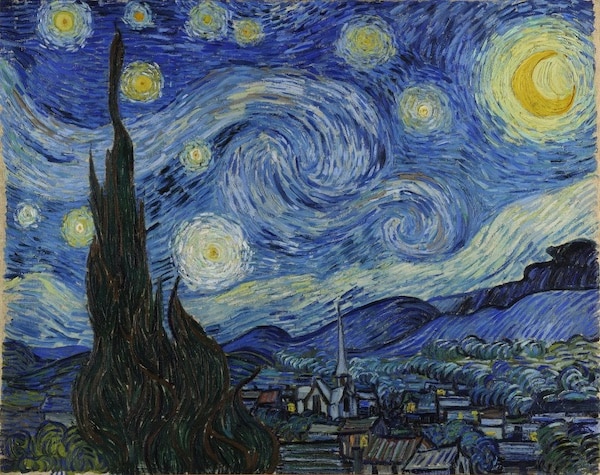Dear friends,
Greetings from the desk of Tricontinental: Institute for Social Research.
In 1930, Clément Fraisse (1901—1980), a shepherd from France’s Lozère region, was confined in a nearby psychiatric hospital after he tried to burn down his parents’ farmhouse. For two years, he was held in a dark, narrow cell. Using a spoon, and later the handle of his chamber pot, Fraisse carved symmetrical images into the rough, wooden walls that surrounded him. Despite the inhumane conditions in these psychiatric hospitals, Fraisse made beautiful art in the darkness of his cell. Not far from Lozère is the monastery of Saint Paul de Mausole in Saint-Rémy-de-Provence, where Vincent van Gogh had been confined four decades earlier (1889—1890) and where he completed around 150 paintings, including several important works (among them The Starry Night, 1889).
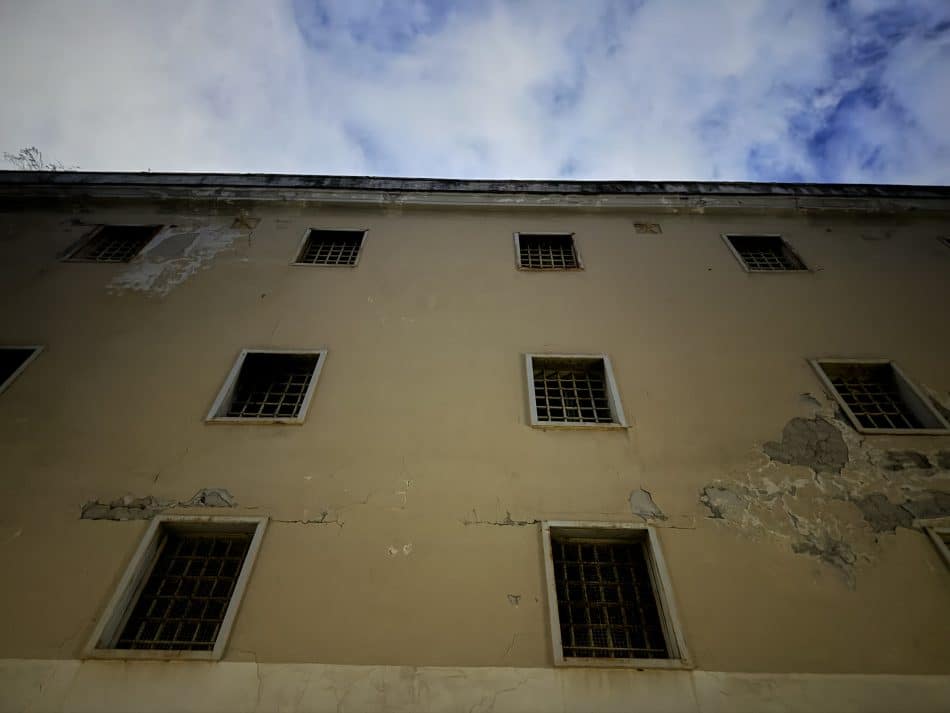
Ex OPG, Naples (Italy), 2024.
I was thinking about both Fraisse and Van Gogh when I visited the old Ospedale Psichiatrico Giudiziario (OPG) in Naples (Italy) in September for a festival that took place in this former criminal asylum, which once held those who had committed serious offences and were deemed to be insane. The vast building, which sits in the heart of Naples on the Monte di Sant’Eframo, was first a monastery (1573—1859), then a military barrack for the Savoy regime during Italy’s unification in 1861, and then a prison set up by the fascist regime in the 1920s. The prison was closed in 2008, and then, in 2015, occupied by a group of people who would later form the political organisation Potere al Popolo! (Power to the People!). They renamed the building Ex OPG—Je so’ pazzo, ‘ex’ meaning that the building is no longer an asylum, and Je so’ pazzo referring to the favourite song of the beloved local singer Pino Daniele (1955—2015), who died around the time the building was occupied:
I’m crazy. I’m crazy.
The people are waiting for me.
….
I want to live at least one day as a lion.Je so’pazzo, je so’ pazzo.
C’ho il popolo che mi aspetta.
….
Nella vita voglio vivere almeno un giorno da leone.
Today, the Ex OPG is home to legal and medical clinics, a gym, a theatre, and a bar. It is a place of reflection, a people’s centre that is designed to build community and confront the loneliness and precarity of capitalism. It is a rare kind of institution in our world, one in which an exhausted society is increasingly isolated and individuals, encaged in a prison house of frustrated aspirations, nonetheless hope to use their meagre tools (a spoon, the handle of a chamber pot) to carve out their dreams and to reach for the starry sky.
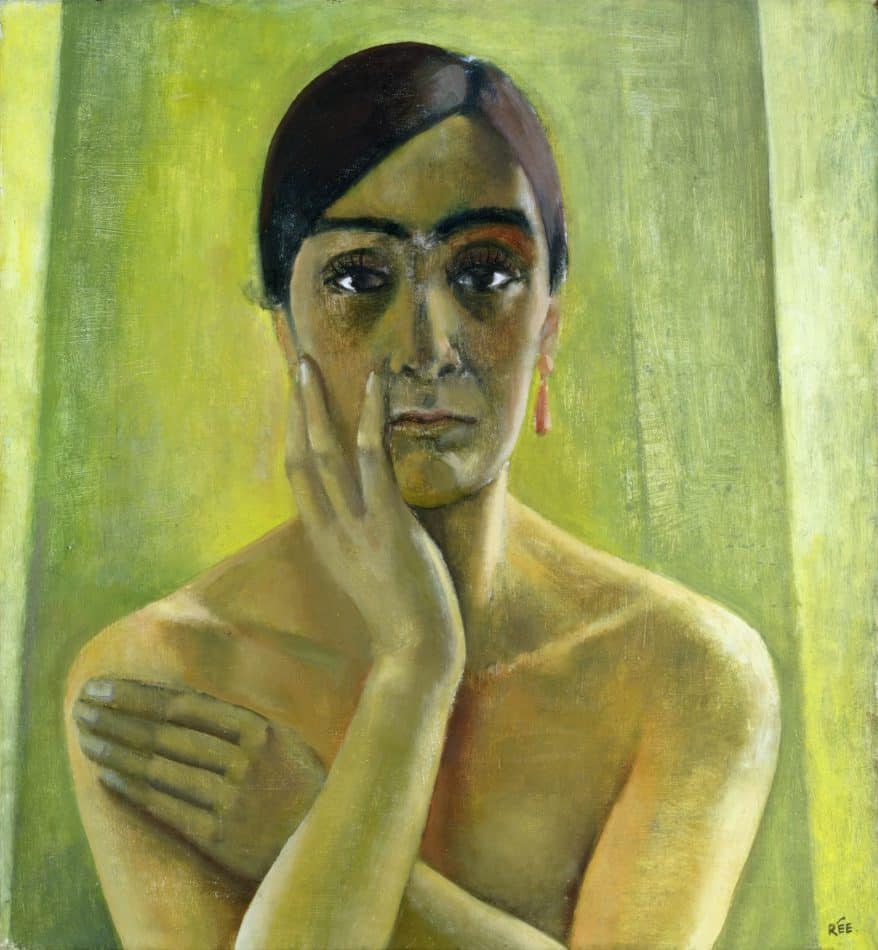
Anita Rée (Germany), Self-Portrait, 1930.
Rée (1885—1933) killed herself after the Nazis declared her work to be ‘degenerate’.
Even the World Health Organisation (WHO) does not have sufficient data on mental health, largely because the poorer nations are unable to maintain an accurate account of their populations’ immense psychological struggles. As a result, the focus is often limited to the more affluent countries, where such data is collected by governments and where there is greater access to psychiatric care and medications. A recent survey of thirty-one countries (mostly in Europe and North America, but also including some poorer nations such as Brazil, India, and South Africa) shows a shifting attitude and increased concern about mental health. The survey found that 45% of those polled selected mental health as ‘the biggest health problems facing people in [their] country today’, a significant increase from the previous poll, conducted in 2018, in which the figure was 27%. Third in the list of health challenges is stress, with 31% selecting it as the leading cause of concern. There is a significant gender gap in attitudes towards mental health amongst young people, with 55% of young women selecting it as one of their primary health concerns, compared to 37% of young men (reflecting the fact that women are disproportionately impacted by mental health issues).
While it is true that the COVID-19 pandemic heightened mental health problems across the world, this crisis predated the coronavirus. Information from the Global Health Data Exchange shows that in 2019—before the pandemic—one in eight, or 970 million, people from around the world had a mental disorder, with 301 million struggling with anxiety and 280 million with depression. These numbers should be seen as an estimate, a minimum picture of the severe crisis of unhappiness and maladjustment to the current social order.
There are range of ailments that go under the name of ‘mental disorder’, from schizophrenia to forms of depression that can result in suicidal ideation. According to the WHO’s 2022 report, one in 200 adults struggle with schizophrenia, which on average results in a ten- to twenty-year reduction in life expectancy. Meanwhile, suicide, the leading cause of death amongst young people globally, is responsible for one in every 100 deaths (bear in mind that only one in every twenty attempts results in a death). We can make new tables, revise our calculations, and write longer reports, but none of this can assuage the profound social neglect that pervades our world.
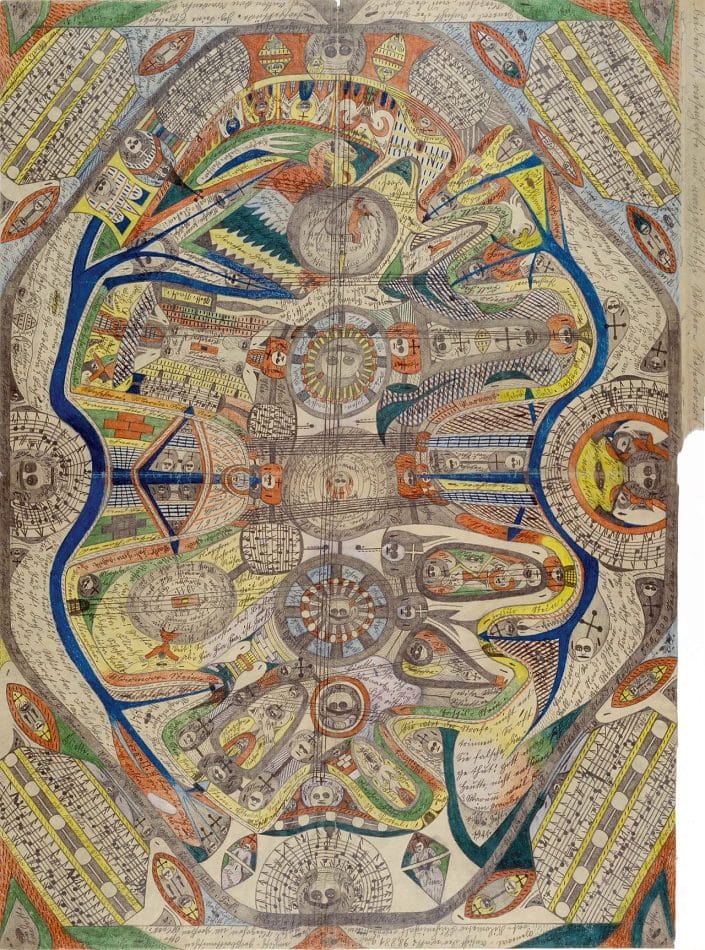
Adolf Wölfli (Switzerland), General View of the Island Neveranger, 1911.
Wölfli (1864—1930) was abused as a child, sold as an indentured labourer, and then interned in the Waldau Clinic in Bern, where he painted for the rest of his life.
Neglect is not even the correct word. The prevailing attitude to mental disorders is to treat them as biological problems that merely require individualised pharmaceutical care. Even if we were to accept this limited conceptual framework, it still requires governments to support the training of psychiatrists, make medications affordable and accessible for the population, and incorporate mental health treatment into the wider health care system. However, in 2022, the WHO found that, on average, countries spend only 2% of their health care budgets on mental health. The organisation also found that half of the world’s population—mostly in the poorer nations—lives in circumstances where there is one psychiatrist to serve 200,000 or more people. This is the state of affairs as we witness a general decline of health care budgets and of public education about the need for a generous attitude toward mental health problems. The most recent WHO data (December 2023), which covers the spike in pandemic-related health spending, shows that, in 2021, health care spending in most countries was less than 5% of Gross Domestic Product. Meanwhile, in its 2024 report A World of Debt, the United Nations Conference on Trade and Development (UNCTAD) shows that almost a hundred countries spent more to service their debts than on healthcare. Though these are foreboding statistics, they do not get at the heart of the problem.
Over the course of the past century, the response to mental health disorders has been overwhelmingly individualised, with treatments ranging from various forms of therapy to the prescription of different medications. Part of the failure to deal with the range of mental health crises—from depression to schizophrenia—has been the refusal to accept that these problems are not only influenced by biological factors but can be—and often are—created and exacerbated by social structures. Dr. Joanna Moncrieff, one of the founders of the Critical Psychiatry Network, writes that ‘none of the situations we call mental disorders have been convincingly shown to arise from a biological disease’, or more precisely, ‘from a specific dysfunction of physiological or biochemical processes’. This is not to say that biology does not play a role, but simply that it is not the only factor that should shape our understanding of such disorders.
In his widely read classic The Sane Society (1955), Erich Fromm (1900—1980) built on the insights of Karl Marx to develop a precise reading of the psychological landscape in a capitalist system. His insights are worth re-considering (forgive Fromm’s use of the masculine use of the word ‘man’ and of the pronoun ‘his’ to refer to all of humanity):
Whether or not the individual is healthy is primarily not an individual matter, but depends on the structure of his society. A healthy society furthers man’s capacity to love his fellow men, to work creatively, to develop his reason and objectivity, to have a sense of self which is based on the experience of his own productive powers. An unhealthy society is one which creates mutual hostility, distrust, which transforms man into an instrument of use and exploitation for others, which deprives him of a sense of self, except inasmuch as he submits to others or becomes an automaton. Society can have both functions; it can further man’s healthy development, and it can hinder it; in fact, most societies do both, and the question is only to what degree and in what directions their positive and negative influence is exercised.
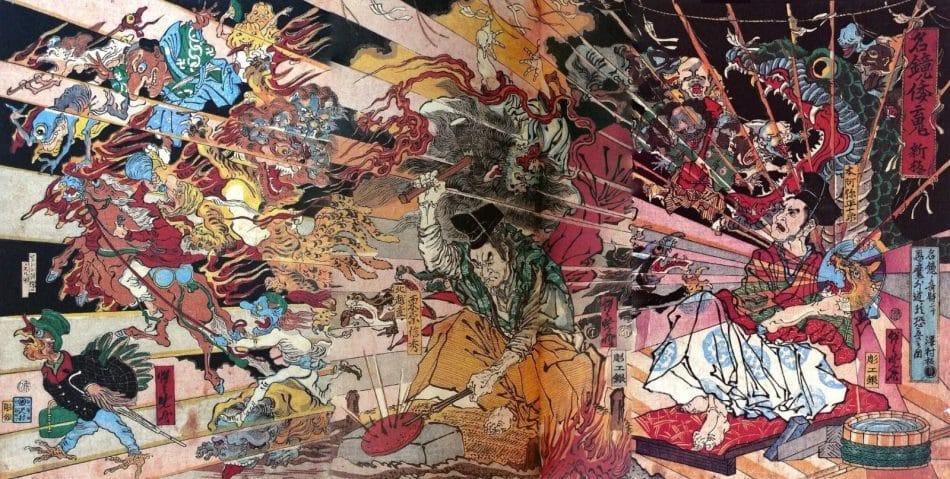
Kawanabe Kyōsai (Japan), Famous Mirrors: The Spirit of Japan, 1874.
Kyōsai (1831—1889) was shocked, at the age of nine, when he picked up a corpse and its head fell off. This marked his consciousness and his later break with ukiyo-e traditional painting to inaugurate what is now known as manga.
The antidote to many of our mental health crises must come from re-building society and forming a culture of community rather than a culture of antagonism and toxicity. Imagine if we built cities with more community centres, more places such as Ex OPG—Je so’ pazzo in Naples, more places for young people to gather and build social connections and their personalities and confidence. Imagine if we spent more of our resources to teach people to play music and to organise sports games, to read and write poetry, and to organise socially productive activities in our neighbourhoods. These community centres could house medical clinics, youth programmes, social workers, and therapists. Imagine the festivals that such centres could produce, the music and joy, the dynamism of events such Red Books Day. Imagine the activities—the painting of murals, neighbourhood clean-ups, and planting of gardens—that could emerge as these centres incubate conversations about what kind of world people want to build. In fact, we do not need to imagine any of this: it is already with us in small gestures, whether in Naples or in Delhi, in Johannesburg or in Santiago.
‘Depression is boring, I think’, wrote the poet Anne Sexton (1928—1974). ‘I would do better to make some soup and light up the cave’. So let’s make soup in a community centre, pick up guitars and drumsticks, and dance and dance and dance till that great feeling comes upon everyone to join in healing our broken humanity.
Warmly,
Vijay

